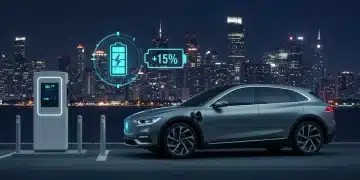Electric vehicle battery advancements: the future of driving

Electric vehicle battery advancements include solid-state technology for increased safety and efficiency, improved recycling practices, and predictions for longer ranges and faster charging, making EVs more sustainable and convenient.
Electric vehicle battery advancements are at the forefront of transforming our driving experience. As technology evolves, we often find ourselves questioning how these improvements will enhance efficiency and accessibility in EVs. Let’s dive into the recent innovations that are reshaping the future of transportation.
Current trends in electric vehicle batteries
Current trends in electric vehicle batteries show a shift towards greater efficiency and sustainability. As technology progresses, the demand for improved performance grows, leading to exciting innovations in battery design and materials.
Advancements in Lithium-Ion Technology
One significant trend is the enhancement of lithium-ion technology, which is widely used in electric vehicles. Manufacturers are focused on increasing energy density, leading to batteries that last longer and charge faster. This is crucial for alleviating range anxiety among potential EV drivers.
Emergence of Solid-State Batteries
Another notable advancement is the emergence of solid-state batteries. These batteries use solid electrolytes instead of liquid ones, providing several key benefits:
- Higher energy density
- Enhanced safety with a lower risk of fire
- Longer lifespan
With these advantages, solid-state technology could revolutionize the electric vehicle market. Major manufacturers are investing heavily in this technology, aiming for commercial viability in the near future.
Focus on Sustainability
Current trends also emphasize sustainability in battery production and disposal. Companies are implementing recycling initiatives to minimize environmental impact. By reclaiming valuable materials, they can produce new batteries without depleting natural resources. This approach not only helps the environment but also reduces costs for manufacturers.
The Role of Government Regulations
Government regulations play a critical role in shaping these trends. Many countries are enforcing stricter emissions standards, encouraging automakers to invest in electric vehicle batteries that contribute to cleaner transportation options.
As the market evolves, we can anticipate more innovations that enhance battery performance and sustainability. The future of electric vehicles is bright, backed by the rapid progress in battery technologies.
By keeping an eye on these trends, consumers can better understand the advancements that will influence their choices in the electric vehicle market.
The impact of solid-state technology

The impact of solid-state technology is transforming the landscape of electric vehicle batteries. This technology is becoming a game changer for efficiency, safety, and longevity.
Increased Energy Density
Solid-state batteries offer significantly higher energy density compared to traditional lithium-ion batteries. This means that electric vehicles can travel farther on a single charge. With advancements in this technology, many manufacturers are optimistic about improving range and performance.
Enhanced Safety Features
Another important aspect of solid-state technology is safety. These batteries use solid electrolytes, which reduce the risk of flammability associated with liquid electrolytes in conventional batteries. This increased safety is vital as it can lead to broader consumer acceptance of electric vehicles.
Furthermore, the design of solid-state batteries helps prevent dendrite growth, a common issue that can cause short circuits. Enhancing safety ensures that drivers feel secure when using electric vehicles.
Longer Lifespan
Solid-state batteries also showcase a longer lifespan compared to their lithium-ion counterparts. This extends the overall operational life of an electric vehicle, reducing the need for frequent battery replacements. By decreasing waste and improving sustainability, solid-state batteries contribute positively to the environment.
Investment in solid-state technology is on the rise as companies recognize the long-term benefits. Major auto manufacturers are racing to develop and implement this technology. The eventual commercial availability of solid-state batteries can reshape the electric vehicle market.
As we explore the future of transportation, the impact of solid-state technology cannot be underestimated. Its potential to enhance electric vehicle performance and user satisfaction is massive, paving the way for a greener and more efficient future.
Recycling and sustainability in battery production
Recycling and sustainability in battery production are crucial aspects of the future of electric vehicle batteries. As the demand for electric vehicles grows, so does the need to manage battery waste responsibly.
Importance of Recycling
Recycling batteries can recover valuable materials, reducing the need to extract raw materials from the earth. This process helps to minimize the environmental impact associated with mining and refining these materials. By recycling, we can significantly lower our carbon footprint and conserve natural resources.
Key Materials in Battery Recycling
Several important materials can be recovered through recycling:
- Lithium: Essential for battery production.
- Cobalt: Used for increasing energy density.
- Nickel: Another critical component for battery efficiency.
Recovering these materials not only supports sustainable practices but also helps in meeting the growing demand for new batteries.
Innovations in Sustainable Production
Innovative companies are developing technologies to improve sustainability in battery production. Some are focusing on using less harmful materials in the manufacturing process. Others are investing in methods that make recycling easier and more efficient.
Additionally, manufacturers are exploring closed-loop systems where used batteries can be reliably processed and turned back into new batteries. This significantly reduces waste and promotes a more sustainable future.
As consumers become more environmentally conscious, awareness of the recycling and sustainability aspects of battery production grows. This shift pushes manufacturers to adopt better practices that align with a sustainable vision for transportation. By keeping sustainability at the forefront, the electric vehicle industry can lead the way toward a greener future.
Future predictions for electric vehicle batteries

Future predictions for electric vehicle batteries indicate a rapid evolution in technology and efficiency. Experts expect significant advancements that will enhance performance and sustainability.
Improved Battery Chemistries
One of the main trends will be the development of new battery chemistries. Researchers are exploring alternatives to traditional lithium-ion batteries, such as lithium-sulfur and sodium-ion batteries. These options could provide higher energy densities and lower costs, making electric vehicles more accessible.
Longer Ranges and Faster Charging
Another exciting prediction is the increase in range and charging speed for electric vehicles. As battery technology improves, it is anticipated that vehicles will achieve ranges well over 400 miles on a single charge. Additionally, advancements in fast-charging solutions will allow drivers to recharge their batteries in just a few minutes, similar to refueling a gas car.
Along with that, manufacturers are focusing on enhancing the lifespan of batteries, addressing a common concern among consumers regarding battery degradation over time. Innovations will likely lead to batteries that can perform well for many years without significant performance loss.
Integration with Renewable Energy
The future will also see a stronger integration of electric vehicle batteries with renewable energy sources. Technologies that allow EVs to store solar or wind energy for later use are emerging. This not only promotes cleaner energy usage but also helps stabilize power grids.
Moreover, the role of battery recycling will continue to grow, with circular economy practices becoming standard. Manufacturers will increasingly adopt strategies to make battery production more sustainable, ensuring that the materials used can be efficiently recycled.
As electric vehicles gain popularity, these predictions highlight a bright future in battery technology. With ongoing research and development, consumers can expect innovative solutions that will make driving electric more practical and sustainable.
In conclusion, the advancements in electric vehicle batteries are paving the way for a more sustainable and efficient future in transportation. From solid-state technology to improved recycling methods, the innovations in this sector promise longer ranges, quicker charging, and a significant reduction in environmental impact. As consumers, we can look forward to electric vehicles that are not only better for the planet but also provide a more enjoyable driving experience. By embracing these changes, we take a step closer to a greener, more sustainable future.
FAQ – Frequently Asked Questions about Electric Vehicle Battery Advancements
What advancements are being made in electric vehicle battery technology?
Current advancements include solid-state technology, which offers improved safety and energy density, as well as enhanced recycling methods.
How does solid-state battery technology differ from traditional batteries?
Solid-state batteries use solid electrolytes rather than liquid, which reduces the risk of fire and increases energy efficiency.
What role does recycling play in the future of electric vehicle batteries?
Recycling is crucial for recovering valuable materials, reducing environmental impact, and promoting sustainable practices in battery production.
What can we expect for the future of electric vehicle ranges and charging times?
Future predictions suggest that electric vehicles will achieve longer ranges and faster charging capabilities, making them more convenient for users.





